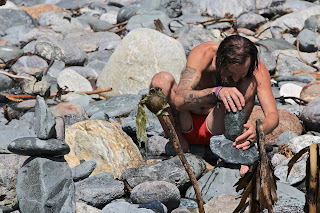The way we, humans, use imagination and language to create stories is probably the most important of all human attributes. Without it we would still be clever monkeys but monkeys none the less, hooting from treetops and throwing poop. So where do they come from, how do they come together; stories?
There are several chain franchise grocery brands in the Kansas City area but two dominate the business. Price Chopper and Hy Vee sell all the same foods, have great delis, offer discounts on gasoline purchases and have great service. Only their decor sets them apart. Price chopper paints with earth tones and colorful murals on every wall, giant bell peppers and huge still-in-the-husk ears of corn, farm-scapes with cabbage fields, tractors and red barns. Hy Vee on the other hand is sterile white, all the walls, displays, coolers, cases and checkout kiosks. My preference of course is to go with all the colors, not so much for color’s sake but at Hy Vee I have an unresolved fear that checkout will follow hospital protocols featuring checkout nurses with blood pressure cuffs, where my Medicare card is more important than my credit card. So I shop Price Chopper.
There are several chain franchise grocery brands in the Kansas City area but two dominate the business. Price Chopper and Hy Vee sell all the same foods, have great delis, offer discounts on gasoline purchases and have great service. Only their decor sets them apart. Price chopper paints with earth tones and colorful murals on every wall, giant bell peppers and huge still-in-the-husk ears of corn, farm-scapes with cabbage fields, tractors and red barns. Hy Vee on the other hand is sterile white, all the walls, displays, coolers, cases and checkout kiosks. My preference of course is to go with all the colors, not so much for color’s sake but at Hy Vee I have an unresolved fear that checkout will follow hospital protocols featuring checkout nurses with blood pressure cuffs, where my Medicare card is more important than my credit card. So I shop Price Chopper.
Last week I stopped at the Price Chopper on 103rd street, at State Line. I only had a couple of needs but restocking my refrigerator with fresh strawberries is both time sensitive and a high priority. I don’t know how they do it but regardless of when you shop or how much you buy, when you get to the checkout there are three carts waiting at every register. No matter, I don’t mind, you can count on the customers ahead of you to entertain. There will be a story in every transaction. This time it was the cashier.
She was a wiry little old lady with big tattoos on both arms, above and below the elbows, short cropped gray hair and heavy frame glasses right out of the 80’s. Using the word ‘wiry’ is correct but inadequate. When those wiry people age, flesh between skin and bone melts away, in its place sinew stretched tight like rubber bands and age wrinkles bear witness to strong, tough experience. She was literally skin & bone but absolutely up to her task. What made her special was the way she moved, like a string puppet, Howdy Doody only three times the speed. Every action required motion at every joint in her body. Every move was quick and necessary to the need but she was extremely animated with fast, short, jerky, articulations. Turning from the register to look at the customer required she move both feet, shift her weight, bend both elbows, tilt her head and lean into the exchange. She was efficient, not missing a detail from double bagging meat to getting wine bottles into brown bags, from checking for mfg. coupons and asking preference on cash-back bills. Every move was spring loaded, separate from the one before as if she had to reset the mechanism. Somewhere inside that bony little body there was a main spring that was wound tight. She was something.
She took my canvas shopping bag, scanned my shoppers card, took my strawberries and checked them for spoilage all without looking at me. When we did make eye contact she stopped cold and said, “I bet you get the Charles Bronson thing all the time?” It stopped me cold, I was bewildered. “You know!” she said, “Charles Bronson, the movie actor.” After a moment I replied, “Yes, I remember Charles Bronson.” She went on as she slid my berries into the canvas bag, “I love him in all those westerns; you look just like him.” I conceded, yes, I liked him too. She pumped her elbows with a big toothy smile, “I bet people are always telling you how much you look like him.” She thanked me for shopping at Price Chopper, handed me my receipt and turned to the next shopper.
Yesterday I stopped at the same Price Chopper, again for more strawberries. The little, tattooed lady was working the same register. Before I could show her my shopper’s card she said to me, “I know your name is Frank but may I call you Charles? It’s a great compliment you know!” Incredible as it sounds, it seemed we were life-long friends. She scanned my berries, checked the bottom for mold, bagged them and added, “I can’t get over how much you look like him.” She wished me a good, ‘rest of my day’ and I walked away. She made me think of the Italian traffic cop who directed traffic like a symphony conductor, guiding his orchestra through a complicated overture. I may never get the rest of her story but I can fill in the holes from my own imagination. I remember Charles Bronson for his “Death Wish” movies more than his westerns and I was sort of a fan. But nobody every told me I looked like him, not until I pushed my strawberries up the conveyer at Price Chopper and came face to face with what’s-her-name. I need to think of a famous, or infamous person that she resembles, even remotely, so I can return the compliment. But I really need to check her name tag the next time I buy strawberries. Probably the best compliment you can give someone just met is to remember their name.






